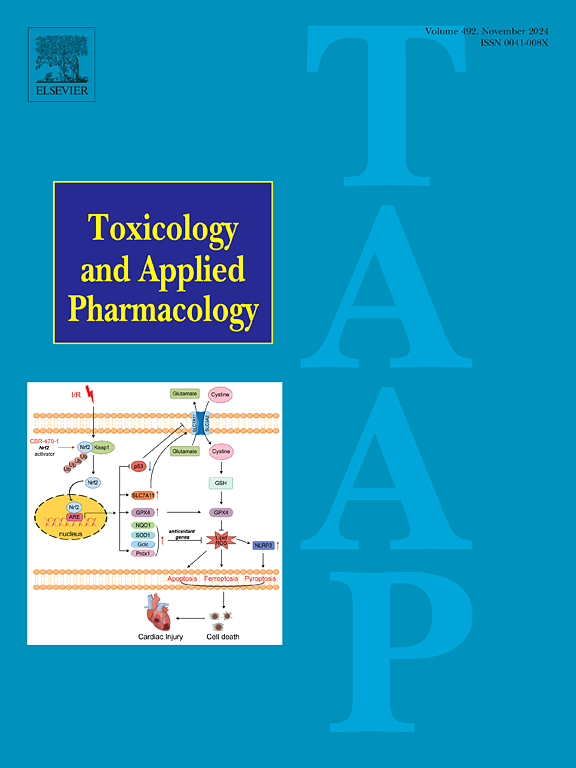Effects of hypoxia and iron on ascorbic acid-mediated cytotoxicity in prostate cancer cell lines
IF 3.3
3区 医学
Q2 PHARMACOLOGY & PHARMACY
引用次数: 0
Abstract
Ascorbic acid (ASC) has long been proposed as a potential cancer co-treatment due to its specific toxicity towards cancer cells, but discrepancies between in vitro and in vivo studies suggest that external factors may modulate its cytotoxicity. Here, we investigate the impact of hypoxia and iron on the therapeutic effectiveness of ASC on prostate cancer cell lines. Hypoxia-induced increases in the EC50 of ASC in the prostate cancer cell lines PC-3, DU 145, LNCaP, and CWR22Rv1 but not in the prostate non-cancer cell lines RWPE-1 and TERT-PrECs. The synthetic androgen dihydrotestosterone did not modify ASC's effectiveness in either normoxia or hypoxia, which was tested because both early and advanced prostate cancer maintain the androgen receptor pathway. The effects of hypoxia on cytotoxicity depend on the drug. Hypoxia did not affect the EC50 for the DNA-damaging agent etoposide but decreased the sensitivity for the anti-microtubule agent paclitaxel in PC-3 and DU 145 cells. Although hypoxic cells were iron deficient, adding iron back to cells did not reverse the effects of the hypoxic atmosphere. Interestingly, the EC50 for ASC was approximately two-fold higher in iron-treated cells than non‑iron-treated cells for the PC-3 line. The higher EC50 was not observed by knocking down ferritin heavy chain mRNA. In summary, both hypoxia and iron attenuate the effectiveness of high concentrations of ASC in prostate cancer cell lines, which may affect the therapeutic benefit of ASC for prostate cancer patients.
缺氧和铁对抗坏血酸介导的前列腺癌细胞毒性的影响。
抗坏血酸(ASC)由于其对癌细胞的特异性毒性,长期以来一直被认为是一种潜在的癌症联合治疗药物,但体外和体内研究的差异表明,外部因素可能会调节其细胞毒性。在这里,我们研究了缺氧和铁对ASC对前列腺癌细胞治疗效果的影响。低氧诱导前列腺癌细胞系PC-3、DU 145、LNCaP和CWR22Rv1中ASC的EC50升高,而前列腺非癌细胞系RWPE-1和TERT-PrECs中EC50升高。由于早期和晚期前列腺癌都维持雄激素受体通路,因此,合成雄激素二氢睾酮在常氧或缺氧条件下都不会改变ASC的有效性。缺氧对细胞毒性的影响取决于药物。缺氧不影响PC-3和DU 145细胞对dna损伤剂乙泊苷的EC50,但降低了抗微管剂紫杉醇的敏感性。虽然缺氧细胞缺铁,但向细胞中添加铁并不能逆转缺氧环境的影响。有趣的是,在PC-3细胞系中,铁处理细胞的ASC的EC50大约比未铁处理细胞高两倍。敲低铁蛋白重链mRNA未观察到EC50升高。综上所述,缺氧和铁都会减弱高浓度ASC在前列腺癌细胞系中的有效性,这可能会影响ASC对前列腺癌患者的治疗效果。
本文章由计算机程序翻译,如有差异,请以英文原文为准。
求助全文
约1分钟内获得全文
求助全文
来源期刊
CiteScore
6.80
自引率
2.60%
发文量
309
审稿时长
32 days
期刊介绍:
Toxicology and Applied Pharmacology publishes original scientific research of relevance to animals or humans pertaining to the action of chemicals, drugs, or chemically-defined natural products.
Regular articles address mechanistic approaches to physiological, pharmacologic, biochemical, cellular, or molecular understanding of toxicologic/pathologic lesions and to methods used to describe these responses. Safety Science articles address outstanding state-of-the-art preclinical and human translational characterization of drug and chemical safety employing cutting-edge science. Highly significant Regulatory Safety Science articles will also be considered in this category. Papers concerned with alternatives to the use of experimental animals are encouraged.
Short articles report on high impact studies of broad interest to readers of TAAP that would benefit from rapid publication. These articles should contain no more than a combined total of four figures and tables. Authors should include in their cover letter the justification for consideration of their manuscript as a short article.

 求助内容:
求助内容: 应助结果提醒方式:
应助结果提醒方式:


